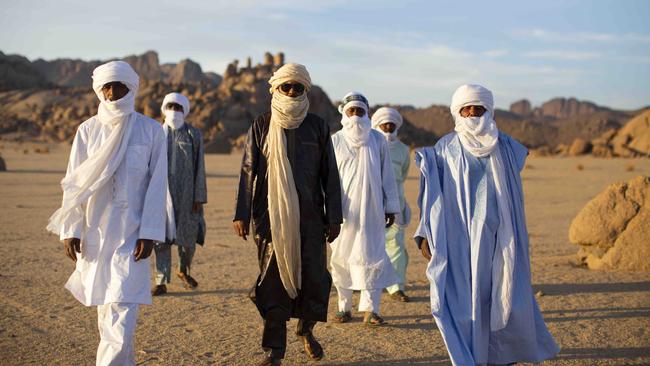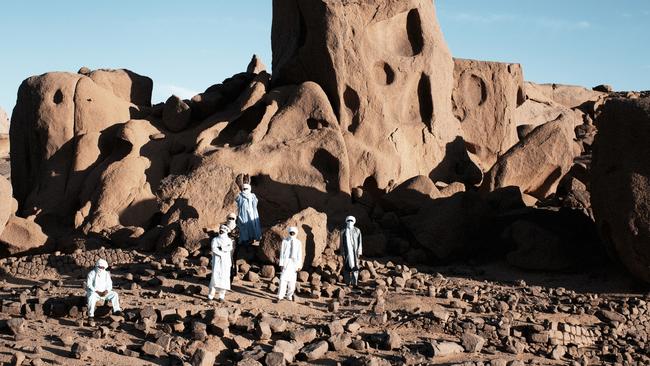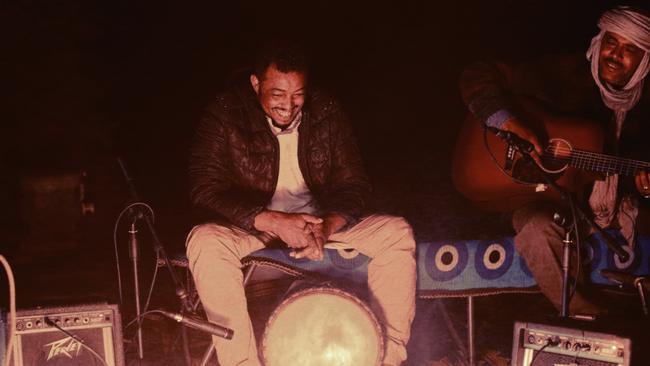The coolest band in the world — but they’d give it up in a second
They’ve won a Grammy, toured the world and released nine studio albums. They’ve jammed with Carlos Santana, collaborated with Thom Yorke, Wilco and our own Warren Ellis, and performed on American late night TV. All they want is peace.

Saharan desert blues collective Tinariwen have won a Grammy, toured the world and released nine studio albums including last year’s acclaimed Amatssou (Beyond the Fear). They’ve jammed with Carlos Santana at the Montreux Jazz Festival, collaborated with Thom Yorke, Wilco and our own Warren Ellis, performed on American late night TV and been widely hailed as the coolest band in the world.
But they would probably trade all of the above for peace in the north of Mali, over whose remote expanse their Tuareg Berber people – the descendants of tribesmen who ran the trans-Saharan trade routes for two centuries – once roamed freely. That was before the decades-long separatist struggle that was being waged against the Malian government sent Tinariwen’s then teenage members into battle, their faces hidden behind indigo-blue scarfs, a Kalashnikov and a Stratocaster strapped across each shoulder.
Or at least, that is the story that has persisted ever since Tinariwen burst into global view in the early Noughties, having come together in a military training camp in Libya under the aegis of Colonel Gaddafi. Their guitar-driven songs were, at first, a means of communal expression, and a particular outlet for the band’s founder Ibrahim Ag Alhabib, who was four-years-old when his father was executed by Malian soldiers during the first Tuareg rebellion of 1963. Alhabib wrote Tamashek-language lyrics rooted in protest: “63 has gone but will return, those days have left their traces,” he sang, accompanying himself on a guitar fashioned from an oil can, a stick and bicycle brake wire, which he’d built after watching a western film featuring guitar-slinging cowboys at a makeshift desert camp cinema.
The ultimate rock’n’roll rebel, Alhabib still lives his life in the desert, sleeping under the stars in an area outside mobile phone range; motorbike messengers are dispatched whenever Tinariwen are thinking of touring or recording. Like another of the band’s co-founders, late Tuareg poet Japonais – to whom Amatssou is dedicated – guitarists Alhassane Ag Touhami and Abdallah Ag Alhouesseyni were originally shepherds, at one with the Sahara and her shifting dunes, her djinns, shadows and mysteries.
“The silence of the desert is essential to our creative process,” says Alhouesseyni via email from Tamanrasset, a large city in southern Algeria near the Malian border and a hub for exiled Tuaregs from Mali and countries (Chad, Niger) across the Sahel.
“We spent three weeks in a desert recording camp (at an oasis called Djanet) for this new album, rehearsing outside, sharing songs we’d written individually, creating songs together. Our message is that we still have to fight for our people and our land, no matter how complicated and dangerous the situation.”

Amatssou was supposed to be recorded at the Nashville studio of famed rocker Jack White (White Stripes), who’d wanted to fold country music into the six-strong collective’s pioneering desert blues sound (think a guitar-driven drone augmented by handclaps, hand-drums and call-and-response vocals). But in the same way that the 2012 Malian coup stopped Alhabib and two band members from leaving the country to join the rest of the Tinariwen line-up at that year’s WOMADelaide (members of French band LoJo stood in), so did the Covid pandemic thwart their travel plans, sending them – perhaps serendipitously – into the desert.
The album was countrified remotely: celebrated composer/musician Daniel Lanois, who’d been mooted to produce, added piano, strings and twanging pedal steel to two of the tracks. County music players Fats Caplin and Wes Corbett contributed fiddle and banjo. While such shimmers dovetail with the country music-loving Zeitgeist (pop stars from Beyonce to Lana del Rey and Ed Sheeran have been crossing over into country), they find common ground in music that was born out of heartbreak and struggle. Music whose buoyant, often danceable rhythms belie the melancholia of their subject matter.
Country and western, rhythm and blues, Delta blues, desert blues ... it all goes back to Africa.
“Like dropping a bucket into a deep well,” said Robert Plant of Tinariwen after returning from the inaugural 2001 Festival of the Desert, a celebration of Tuareg culture staged outside Timbuktu – where Tinariwen, sharing a bill with artists including Lojo, plugged their guitars into portable amps and blew back the hair of the 100 or so people who’d ground- travelled for three days to be there.
“Our music is country music,” states Alhousseyni. “We play our music while sitting around campfires at night. We have a rhythm called tinde that is based on the gait of a camel. The banjo is coming from Africa. On this album we use Martin guitars like the singer/songwriter Willie Nelson.”
Plant’s guitarist Justin Adams produced their debut album, The Radio Tisdas Sessions, named for the local Tuareg radio station in Kidal, a Malian town on the edge of the Sahara. The world took note: Tinariwen recorded and toured, toured and recorded, spreading their message about Tamashek (Tuareg) musical heritage as further Tuareg uprisings and infighting between extremists, as well as severe bouts of drought and famine, besieged their Saharan homeland.
Peace and unity has long been their goal. Tinariwen are determinedly anti-Salafist. They told me as much back in 2011, over tea they brewed on a camping stove in the middle of their (preferred) shared hotel room in Kings Cross, central London, midway through a European tour of Tassili, the Grammy-winning album produced by Ian Brennan and featuring Nels Cline, of Wilco, and Kyp Malone, of TV On The Radio.

They reinforce the urgency now. “There is increasing fear in the north of Mali, especially since last December when the Malian junta, supported by Russian mercenaries, took the Azawad,” says Alhousseyni, using the collective Tuareg name for all Tuareg areas, as yet stateless, particularly the north of Mali and over into neighbouring Niger. “Villages like Kidal are empty; people left or were killed. There are drone attacks on the roads. It is a never-ending war with consequences every day. Tuareg culture is under threat.”
As Amatssou insists, fear is not an option: “Dear brothers, all leisure will always be far from reach unless your homeland is liberated and all the elders can live there in dignity,” sings Alhabib on Arajghiyine. On Tenere Den, a hitherto-unreleased song written in the early 2000s, he proclaims, “Out there, the great desert, white at times, and at other times red with the blood of the martyrs”. Their unwavering commitment has inspired a new, younger generation of desert blues acts including the Tamanrasset-based Imarhan, and Niger’s Mdou Moctar – whose new album Funeral For Justice includes the fiery, lo-fi Imouhar, a track encouraging the Tuareg people not to let their Tamashek language become obsolete.
“People still think that desert blues is a Tuareg in a dress with a guitar,” says Alhousseyni. “The West still doesn’t know much about our music, our world. But playing in front of an audience in the USA or Europe or Australia is often what makes us realise we are touching people. That they can feel what we are singing about even if they don’t know the words.
“People have to know about our culture, our language, our situation. Our songs create a unity for those who aspire to the dignity and grandeur of the Tuareg cause. Younger generations will use them and improve them. We can’t do any more.”
He reiterates his gratitude for his long run in Tinariwen, for the opportunities afforded, the accolades bestowed and the doors opened to them all over the world.
“But I prefer that my children should have the chance to live in peace,” he states.
“And that we can all go home.”
Tinariwenperform at Sydney Opera House on June 1 for Vivid and will tour nationally.
